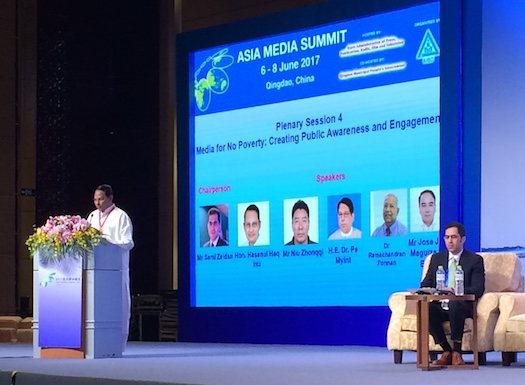There has been some progress on achieving the UN Sustainable Development Goals about poverty, but there is still more to do, said Al Jezeera’s Sami Zeidan, opening a session on media and poverty at this week’s Asia Media Summit.
Bangladesh Communications Minister Hasanul Haq Inu took up the theme, telling delegates that media have a role to play in reducing poverty.
“The ‘poverty bomb’ is just as dangerous as nuclear bombs,” said Minister Inu. “Media is a world wide force, we ask you to partner with the rest of us to help reduce poverty.”
One billion people live in extreme poverty and media has a big role to play to get them out of it, according to the minister.
He asked media to sensitise audiences to poverty, promote social economy, open public forums to let people express their views and give a voice to the voiceless.
The vice president of Ningxia TV Niu Zhonqqi said those living in poverty in China have dropped from 170 million to 65 million and the government is trying to improve this further.
“Reporting and coverage of these developments is important. The media in China are reporting on how people are living in a very warm way, so that spirits are lifted for those in poverty, and they are showing ideas of how poverty can be reduced.
“The media has provided a lot of information about the government policies in poverty reduction efforts… and is very important for targeting poverty reduction activities and sharing information across the nation so that people in all provinces can see the good ideas that are taking place in other areas of the country.”
“In Chinese culture we emphasise equality. We all follow this policy, but of course the reality is that wealth is not evenly distributed across our country.
“There are areas where there is good weather and natural resources, but in the western regions the weather and natural resources are lower, so we have an obligation to help these people.”
Myanmar’s Information Minister Pe Myint told delegates that one of the causes of poverty in his country is ethnic armed conflict, which has been happening for 70 years.
“Budget money is being spent on weapons, which we cannot spend on eradicating poverty. Government mismanagement historically has also been a reason why we have not been able to eradicate poverty,” he said, acknowledging the problems of the past.
“We are now taking measures to try and address these problems and find solutions and the media has an important role to play in helping us achieve transparency and good governance.
“In Myanmar our national and private media are helping us. Private media has only been open for about 5 years and our country is in the process of democratisation and liberalisation.
“We have revoked censorship and improving access to information, so that the media can help in performing the role of watch dog by covering the issues and informing people of what we are dong and telling us their thoughts of what must be done.”
Malaysia has had consistent economic growth of about 5% over the past decades, “yet there still exist pockets of poverty,” said Malaysian University Professor Ramachandran Ponnan.
There have been many structured plans in the past, and more for the future according to Ponnan.
AIBD has collaborated wth Taylors University in a study in this area, which explored the role of media and poverty.
“Broadcasters have to negotiate a balance between commercialism and worthy aims such as reducing poverty, but they have a critical role in the transformation of our world.
“Creating awareness is easy for the media, creating engagement with the issues is more difficult.”
Executive Director of the Philippines President’s Task Force on Media, Jose Joel Magulza Sy Egco said less than one percent of news stories around the world cover poverty.
Why?
It is not an appealing topic for writers, and audiences are perceived not to be interested in these stories.
Other reasons include low manpower and cost pressures on media. EPs are also reluctant to air stories about the poor, they want aspirational topics on their channels.
So there is poor coverage of these important issues.
How to solve this?
“Media workers need to feel the need to cover this. They have to relate to the issue personally, then launch a crusade to produce results.
“Reporters need to be immersed… to give poverty a human face and a human heart. Media should also look for better angles to allow these topics to be covered.
“In the Philippines we have two important measures to encourage media engagement: freedom of information guidelines and government help in reducing killings of media workers. With these measures we are trying to get media more engaged in covering poverty issues so that we can help alleviate these problems,” he said.

